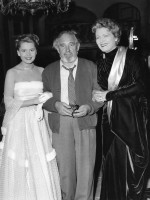Willy Schmidt-Gentner is a Actor, Director, Sound and Compositor Allemand born on 6 april 1894 at Neustadt am Rennsteig (German)

Willy Schmidt-Gentner (né le 6 avril 1894 à Neustadt am Rennsteig , mort le 12 février 1964 à Vienne) est un compositeur de musique de film. Son œuvre est très prolifique et participe à de nombreux films classiques des cinémas allemand et autrichien.
Lors de l'avènement du cinéma parlant, les commandes se multiplient auprès de lui, il compose parfois jusqu'à dix musiques de film par an. Il préfère les comédies légères, des romances musicales et va parfois vers le drame avec un arrière-plan politique, voire les films de propagande (Wien 1910 (1943)), ou le film historique (Spionage (1955)).
Lors de l'arrivée au pouvoir des nazis, il devient membre du NSDAP en mai 1933 puis part en 1934. En 1933, il s'installe à Vienne où le studio Mondial Film fait de lui un réalisateur : Die Pompadour (1935), Der Weg des Herzens (1936). Pour la compagnie Sascha-Film, il compose les musiques de grands films viennois : Mascarade (1934), Hohe Schule (1934). Après l'Anschluss, il accepte la production nazie, autant des comédies que des films de propagande : Heimkehr (1941), Das Herz muß schweigen (1944). Il fait la connaissance de réalisateurs pour lesquels il continuera d'écrire plus tard, Willi Forst et Gustav Ucicky : Le Maître de poste (1940), Opérette (1941), Sang viennois (1942).
Après la guerre, il compose toujours autant. Il s'arrête en 1955. Willy Schmidt-Gentner aura composé pour plus de 200 films.
Source : Wikidata
Willy Schmidt-Gentner

- Infos
- Photos
- Best films
- Family
- Characters
- Awards
Nationality German
Birth 6 april 1894 at Neustadt am Rennsteig (German)
Death 12 february 1964 (at 69 years) at Vienna (Austria)
Birth 6 april 1894 at Neustadt am Rennsteig (German)
Death 12 february 1964 (at 69 years) at Vienna (Austria)
Willy Schmidt-Gentner (né le 6 avril 1894 à Neustadt am Rennsteig , mort le 12 février 1964 à Vienne) est un compositeur de musique de film. Son œuvre est très prolifique et participe à de nombreux films classiques des cinémas allemand et autrichien.
Biography
Enfant, Willy Schmidt-Gentner apprend le violon et la composition auprès de Max Reger. Après la Première Guerre Mondiale, il travaille comme fonctionnaire chargé de vérifier la fiscalité auprès des propriétaires de salles de cinéma. L'un d'eux lui propose un emploi de chef d'orchestre. Son intérêt pour la musique de film s'accroît et il signe sa première composition en 1922 pour un film muet. Il joue aussi du piano lors de séances de théâtre. Il obtient vite des succès : La Mandragore (1928), L'Enfer blanc du Piz Palü (1929), Hokuspokus (1930).Lors de l'avènement du cinéma parlant, les commandes se multiplient auprès de lui, il compose parfois jusqu'à dix musiques de film par an. Il préfère les comédies légères, des romances musicales et va parfois vers le drame avec un arrière-plan politique, voire les films de propagande (Wien 1910 (1943)), ou le film historique (Spionage (1955)).
Lors de l'arrivée au pouvoir des nazis, il devient membre du NSDAP en mai 1933 puis part en 1934. En 1933, il s'installe à Vienne où le studio Mondial Film fait de lui un réalisateur : Die Pompadour (1935), Der Weg des Herzens (1936). Pour la compagnie Sascha-Film, il compose les musiques de grands films viennois : Mascarade (1934), Hohe Schule (1934). Après l'Anschluss, il accepte la production nazie, autant des comédies que des films de propagande : Heimkehr (1941), Das Herz muß schweigen (1944). Il fait la connaissance de réalisateurs pour lesquels il continuera d'écrire plus tard, Willi Forst et Gustav Ucicky : Le Maître de poste (1940), Opérette (1941), Sang viennois (1942).
Après la guerre, il compose toujours autant. Il s'arrête en 1955. Willy Schmidt-Gentner aura composé pour plus de 200 films.
Best films
Usually with
Filmography of Willy Schmidt-Gentner (79 films)
Sound
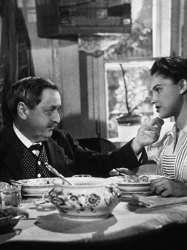
Schrammeln (1944)
, 1h33Directed by Géza von Bolváry
Genres Comedy, Musical
Themes Films about music and musicians, Musical films
Actors Marte Harell, Hans Holt, Hans Moser, Paul Hörbiger, Inge Egger, Joseph Egger
Rating71%





This script must be run from the command line

Vienna 1910 (1943)
, 1h32Origin German
Genres Drama, Biography
Themes Politique, Political films
Actors Rudolf Forster, Heinrich George, Lil Dagover, Carl Kuhlmann, O.W. Fischer, Otto Tressler
Roles Original Music Composer
Rating61%





Vienne, le 7 mars 1910. Une nouvelle remue la capitale impériale : Le Lueger est en train de mourir !. L'homme tout aussi populaire que controversé de 65 ans, maire depuis 13 ans, ne s'est pas fait que des amis au cours de sa carrière politique. Les officiers de l'armée se sont réunis à la Hofburg et y vont de leurs commentaires fort peu hagiographiques.
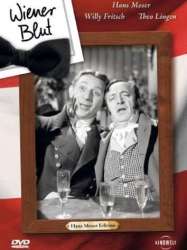
Viennese Spirit (1942)
, 1h43Directed by Willi Forst
Genres Comedy, Musical, Romance
Themes Films about music and musicians, Musical films, Operetta films
Actors Willy Fritsch, Maria Holst, Hedwig Bleibtreu, Hans Moser, Theo Lingen, Paul Henckels
Rating67%





The young Count Georg Wolkersheim (Willy Fritsch) is sent to the Congress of Vienna to represent the interests of his country, Reuss-Schleiz-Greiz. Tensions arise between the count, his wife Melanie (Maria Holst), and their two chamberlains (Hans Moser and Theo Lingen), and when the four of them attend a court ball, Melanie leaves Georg, assumes the identity of a famous actress, and attracts the affections of Crown Prince Ludwig of Bavaria (Fred Liewehr). Georg quits the ball and returns to his lodgings to wait for his wife. Meanwhile, the two servants plot to further inflame Georg's jealousy by posing as Ludwig to commission a portrait of Melanie from the famous artist Moritz Daffinger (Egon von Jordan). The next day, however, Georg and Daffinger expose the servants' ruse, Ludwig reveals to Melanie that he has discovered her true identity, and all is forgiven.
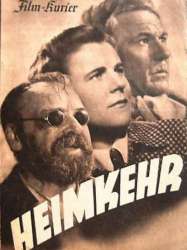
Homecoming (1941)
, 1h36Directed by Gustav Ucicky
Genres Drama
Themes Documentary films about war, Documentary films about historical events, Political films, Documentary films about World War II
Actors Paula Wessely, Attila Hörbiger, Carl Raddatz, Otto Wernicke, Ruth Hellberg, Elsa Wagner
Roles Music
Rating42%





In the Wołyń Voivodeship in eastern Poland, the German minority is oppressed by the Polish majority. The physician Dr. Thomas does not have any hospital available and his daughter Marie, who teaches at a German school, and needs an important operation, watches when her school is disseized by Polish authorities and demolished by an angry mob. Dr. Thomas protests to the mayor, noting the constitutionally guaranteed minority rights; however his protest falls on deaf ears. Marie and her fiancé, Dr. Fritz Mutius, drive to the provincial capital, in order to put their protest to the Voivode (governor), but they are not even received there either. Deciding to stay in the capital in order to call on the court the next day, that evening they go to the cinema. They are accompanied there by her friend Karl Michalek, who has been pressed into service by the Polish Armed Forces. When they refuse to sing the Polish national anthem Mazurek Dąbrowskiego with the rest of the audience, Fritz gets grievously hurt by the furious Polish crowd. Marie tries to take her betrothed to a hospital, but he is refused admission and succumbs to his injuries.
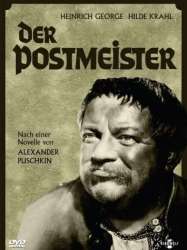
The Postmaster (1940)
, 1h35Directed by Gustav Ucicky
Origin German
Genres Drama
Actors Heinrich George, Siegfried Breuer, Hilde Krahl, Hans Holt, Ruth Hellberg, Frida Richard
Roles Original Music Composer
Rating67%





The daughter of a stationmaster falls in love with a cavalry captain. He persuades her to run away with him to St. Petersburg, but she realizes there that he never intended to marry her.

Beloved Augustin (1940)
, 1h35Genres Comedy, Musical
Actors Paul Hörbiger, Michael Bohnen, Rudolf Prack, Franz Böheim, Maria Andergast, Anton Pointner
Roles Music
Rating60%





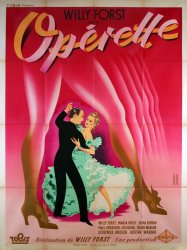
Operetta (1940)
, 1h40Directed by Willi Forst
Themes Films about music and musicians, Musical films, Operetta films
Actors Maria Holst, Willi Forst, Paul Hörbiger, Curd Jürgens, Siegfried Breuer, Gustav Waldau
Roles Music
Rating77%





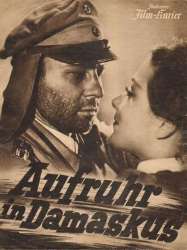
Uproar in Damascus (1939)
, 1h43Directed by Gustav Ucicky
Origin German
Themes Politique, Political films
Actors Brigitte Horney, Hans Nielsen, Ernst von Klipstein, Paul Otto, Paul Westermeier, Gerhard Bienert
Rating59%





Pendant la Première Guerre mondiale, des troupes allemandes sont aux prises avec une révolte arabe menée par Lawrence d’Arabie et les Britanniques.
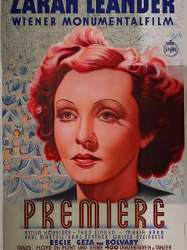
Premiere (1937)
, 1h22Directed by Géza von Bolváry
Origin Austria
Genres Thriller, Musical, Crime
Themes Musical films
Actors Zarah Leander, Attila Hörbiger, Karl Martell, Theo Lingen, Richard Eybner, Karl Günther
Rating63%





Le commissaire Helder accompagne sa mère à la première d'une nouvelle revue. Dans les coulisses, où l’excitation est à son comble, il lui présente quelques collaborateurs du théâtre, comme le Dr. Seebauer. Puis il tombe sur Lucky, un repris de justice, à qui il conseille de se tenir tranquille. En coulisse, on s'affaire aux derniers préparatifs. Les danseuses bavardent sur le fait que l’ex-star Lydia Loo n'a pas eu de rôle dans la pièce. Pendant ce temps, Lydia crie à Frank, le directeur du théâtre, qu'elle ne va pas se laisser traiter ainsi impunément. Le directeur a beau protester de son admiration pour la comédienne et de son impuissance face aux choix de production : Lydia affirme qu'elle sait de source sûre que le producteur Rainold a cherché à l'écarter et que Frank ne pouvait ignorer que cela ferait scandale que Rainold lui préfère une jeunesse, Carmen Daviot. Rainold entre alors dans la pièce, et Lydia le menace d'une arme. Un acteur, Fred Nissen, s'interpose, désarme l'actrice et la fait sortir de la pièce. Rainold exige de Frank qu'il retire son rôle à Nissen car il ne peut supporter ce comédien.

Genres Drama, Musical theatre
Themes Films set in Africa, Spy films, Musical films
Actors Jarmila Novotná, Iván Petrovich, Gerda Maurus, Rudolf Klein-Rogge, Siegfried Schürenberg, Herbert Hübner
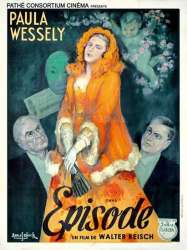
Episode (1935)
, 1h45Directed by Walter Reisch
Origin Austria
Genres Comedy
Actors Paula Wessely, Karl Ludwig Diehl, Otto Tressler, Walter Janssen, Friedl Czepa, Rosa Albach-Retty
Roles Original Music Composer
Rating65%





In Vienna in 1922 daily life is dominated by inflation and unemployment. In the evenings, the population attempt to divert themselves from the miseries of the economic situation by indulgence and excess in bars and clubs. Morale is low, and sinking further.

Only a Comedian (1935)
, 1h35Directed by Erich Engel
Actors Rudolf Forster, Paul Wegener, Hans Moser, Christl Mardayn, Grit Haid, Karl Paryla
Rating61%





The young countess Beate von Dörnberg is travelling to Schönburg to the court of Duke Karl Theodor to take up residence as a lady in waiting. During an interruption in the journey while the coach is being repaired she gets to know two actors. The younger one is rather importunate, but the older one, Florian Reuther, tells her about the art of acting. The conversation is interrupted by the resumption of the journey, and the countess hopes to meet Reuther again.

The Divine Spark (1935)
, 1h22Directed by Carmine Gallone
Origin United-kingdom
Genres Musical
Themes Films about music and musicians, Films about classical music and musicians, Musical films
Actors Marta Eggerth, Benita Hume, Donald Calthrop, Arthur Margetson, Edmund Breon, Phillips Holmes
Roles Music

Asew (1935)
, 1h18Genres Drama
Actors Fritz Rasp, Olga Tschechowa, Wolfgang Liebeneiner, Ellen Frank, Herbert Hübner, Siegfried Schürenberg

High School (1934)
, 1h30Directed by Erich Engel
Origin Austria
Genres Drama
Themes Films about animals, Films about horses
Actors Rudolf Forster, Hans Moser, Paul Henreid, Herbert Hübner, Dinah Grace, Margarete Hruby
Rating63%





"Carlo Cavelli" is the professional name of a world-famous dressage rider (Rudolf Forster), who always wears a mask in his public performances and whose real name is unknown. He is about to appear in Vienna, which causes a sensation. At the dressage competition he comes to the attention of Irene von Ketterer (Angela Salloker), a young woman who after a fight with her mother (Camilla Gerzhofer) has gone to stay with a friend. She is so impressed with him that she decides that she too will become a dressage rider. After a time she manages to obtain personal tuition from the normally unapproachable Cavelli. At first their relationship is very friendly, but when he discovers the name of his pupil, Cavelli attempts to distance himself from her. This is because his life was totally changed by a duel in which he shot and killed his best friend's son, Franz, Irene's brother (Paul von Hernried), an action the memory of which still tortures him. Nevertheless, after an interval, he acknowledges his great attraction to Irene and after establishing that her feelings for him are reciprocated, he decides to ask for her hand in marriage. At the same time however he also asks her to travel to London with him the very next day.
 Connection
Connection

